Monograph Villa Lanna in Prague available for foreign readers




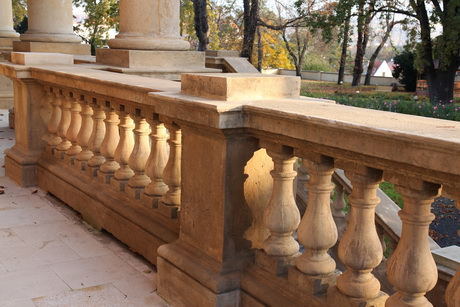
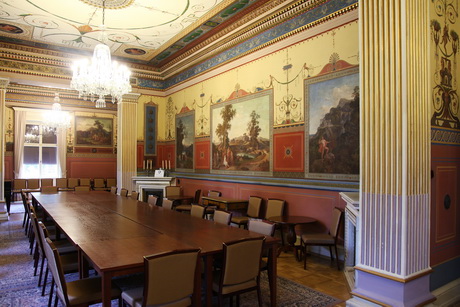
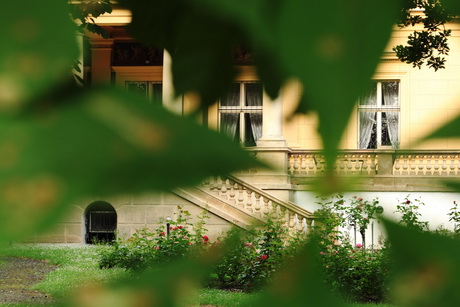
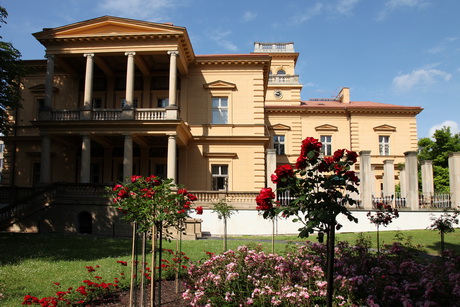

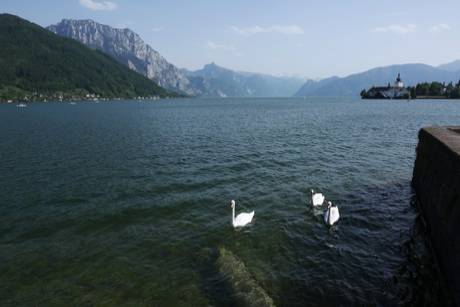
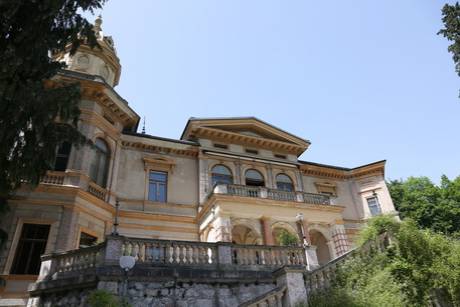
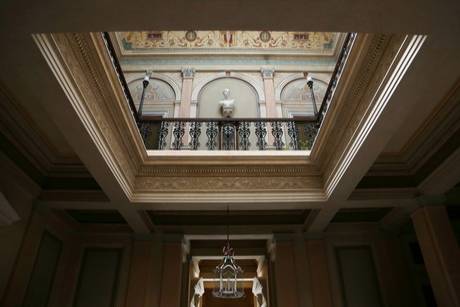

Photos: Stanislava Kyselová, Academic Bulletin
The monograph is currently available also for foreign readers, as it was just published in English version. Furthermore it has been extended of a chapter dedicated to villa Lanna in Gmunden, which became the most important Neo-Renaissance villa in the neighbouring Austria.
Adalbert Lanna Junior approached both his villas as complex pieces of art: architecture, painting and sculpting decoration as well as handicraft details are all produced on the same stylistic level and in the highest possible quality. The ideological programme of both villas is very personal. We repeatedly meet allusions to the building owners’ profession, his important social status and cultural mission. The owner’s wife plays an important part in the decoration of the villas, but in the Bubeneč villa it is above all their son, Adalbert Lanna III, the predestined successor of the family. This ideological programme, elaborated to the smallest details, is at the same time approached in such a way as to satisfy even the most demanding visitor intellectually as well as aesthetically. With this construction, Adalbert Lanna Junior successfully stands side by side with magnates of the Renaissance Italy, grand dukes of Medici, dignitaries of the Venetian Republic or Roman popes. They all left behind individualized residence that carry the stamps of their owners at the one hand, but have timeless validity and fascinate each visitor to this day. Villa Lanna in Bubeneč is one of the last European residences through which its owner declares who he is, where he comes from and where he is heading.
The Staff is indebted to Prof. Jan Bažant who kindly wrote the historical and artistic aspects of this magnificent edifice.
News
14 Mar 2016 ESOF 2016 Travel Grants for young researchers in graphene The European Science Foundation (ESF) and Graphene Flagship in collaboration with EuroScience have opened a call for early career researchers who are involved in graphene and related materials research activities to help cover the costs of registration, travel and accommodation to attend ESOF2016. The selected applicants will have the opportunity to participate in the tour visit organised to the National Graphene Institute (NGI) in Manchester and to attend the reception for young researchers at ESOF2016. More information on http://www.euroscience.org/news/grants-for-young-researchers-working-on-graphene-related-research-activities-to-attend-esof2016/.
The European Science Foundation (ESF) and Graphene Flagship in collaboration with EuroScience have opened a call for early career researchers who are involved in graphene and related materials research activities to help cover the costs of registration, travel and accommodation to attend ESOF2016. The selected applicants will have the opportunity to participate in the tour visit organised to the National Graphene Institute (NGI) in Manchester and to attend the reception for young researchers at ESOF2016. More information on http://www.euroscience.org/news/grants-for-young-researchers-working-on-graphene-related-research-activities-to-attend-esof2016/.
The Research Center of the Oriental Institute (Czech Academy of Sciences) at Academia Sinica in Taiwan (RCT) has been established on December 3, 2015. The Research Center in Taiwan will act as a branch office of the Oriental Institute of the CAS and is intended to serve as a platform to facilitate and strengthen academic exchange between Czech and Taiwanese scholars as well as institutions. The Center is part of a long-term interdisciplinary research project Power and Strategies of Social and Political Order. Czech research fellows will participate in conferences and hold colloquiums with Taiwanese colleagues. In cooperation with the Academia Sinica the institute plan to organize annual joint workshops whose proceedings will be published. Concomitantly it will continue building the network of partner institutions and thus create a solid foundation for further scholarly exchange. In cooperation with Charles University in Prague I will also support doctoral students wishing to conduct research at the Center.
more 21 Jan 2016 Algatech Centre The Algatech Centre, which is a scientific division of the Institute of Microbiology of the CAS located in the baroque building of the Opatovicky mlyn (mill) near Třeboň in South Bohemia, focuses on the research of photosynthetic microorganisms, including algae, cyanobacteria and photosynthetic bacteria.
The Algatech Centre, which is a scientific division of the Institute of Microbiology of the CAS located in the baroque building of the Opatovicky mlyn (mill) near Třeboň in South Bohemia, focuses on the research of photosynthetic microorganisms, including algae, cyanobacteria and photosynthetic bacteria.
There are at least 70 thousand different and varied species of algae in nature and their potential is huge in many respects. The Laboratory of algal biotechnology therefore studies processes and technology involved in the efficient production of algae and the use of algal biomass. It seeks new bio-active compounds in algae to be used as dietary supplements, in pharmacology and biomedicine and cultivates algae enriched with rare chemical elements which are scarce in both human food and animal fodder. Scientists also carry out research into various metabolites of cyanobacteria and their effects on human cells from the pharmacological and toxicological point of view. Special interest is paid to substances inhibiting the division of cancer cells and/or selectively inducing their apoptosis.
 In the presence of Deputy Minister of Education, Youth and Sports, Stanislav Štech, Rector of Charles University Tomáš Zima, Vice-President of the Academy of Sciences of the Czech Republic, Vladimír Mareček, and other important guests, the implementation phase of the BIOCEV project – the Biotechnology and Biomedicine Center of the Academy of Sciences of the Czech Republic and Charles University in Vestec ended December 18, 2015. Full operation is planned beginning January 2016. BIOCEV is currently made up of the implementation of five research programmes and the operation of six sets of research infrastructure and service laboratories. By 2020, as many as 450 researchers, including 200 post-graduate students, are supposed to work at the BIOCEV Center. The Center’s objective is to learn details about organisms at the molecular level that will be used in applied research and in the development of new therapeutic procedures.
In the presence of Deputy Minister of Education, Youth and Sports, Stanislav Štech, Rector of Charles University Tomáš Zima, Vice-President of the Academy of Sciences of the Czech Republic, Vladimír Mareček, and other important guests, the implementation phase of the BIOCEV project – the Biotechnology and Biomedicine Center of the Academy of Sciences of the Czech Republic and Charles University in Vestec ended December 18, 2015. Full operation is planned beginning January 2016. BIOCEV is currently made up of the implementation of five research programmes and the operation of six sets of research infrastructure and service laboratories. By 2020, as many as 450 researchers, including 200 post-graduate students, are supposed to work at the BIOCEV Center. The Center’s objective is to learn details about organisms at the molecular level that will be used in applied research and in the development of new therapeutic procedures.
 The Czech Academy of Sciences has issued a report accounting selected research results achieved by its scientific institutes in all research areas in 2014 and in early 2015. It outlines its research activities, as well as goals of the new research centres and facilities of the CAS and its new Strategy AV21, the main aim of which is to perform top level multilateral interdisciplinary research reflecting the needs of contemporary society. The book (printed version in PDF) documents the CAS´s efforts to transfer research findings into practical outputs and its co-operation with partners in the industrial sphere, it presents the CAS´s co-operation with various institutions on international, regional and local levels and mentions some of the major social events and anniversaries marked by the CAS in 2014 and 2015.
The Czech Academy of Sciences has issued a report accounting selected research results achieved by its scientific institutes in all research areas in 2014 and in early 2015. It outlines its research activities, as well as goals of the new research centres and facilities of the CAS and its new Strategy AV21, the main aim of which is to perform top level multilateral interdisciplinary research reflecting the needs of contemporary society. The book (printed version in PDF) documents the CAS´s efforts to transfer research findings into practical outputs and its co-operation with partners in the industrial sphere, it presents the CAS´s co-operation with various institutions on international, regional and local levels and mentions some of the major social events and anniversaries marked by the CAS in 2014 and 2015.
![]() On the 14th and 15th October 2015 Global Change Research Centre will host an international conference called "Gender Mainstreaming in STEM and Global Change Sciences' (STEM – science, technology, engineering and mathematics). The conference, which is one of the events within a project of FP7 – EGERA, will feature international experts in the field of equal opportunities in science and research. More information here.
On the 14th and 15th October 2015 Global Change Research Centre will host an international conference called "Gender Mainstreaming in STEM and Global Change Sciences' (STEM – science, technology, engineering and mathematics). The conference, which is one of the events within a project of FP7 – EGERA, will feature international experts in the field of equal opportunities in science and research. More information here.
 ITER will be the biggest-ever fusion device generating a plasma whose volume will be close to 840 m3 at 150 million ˚ C, ten times the temperatures at the core of the sun. To achieve these temperatures we would need powerful heating systems using high-energy beams, in order to push together the nuclei and trigger off a fusion reaction.
ITER will be the biggest-ever fusion device generating a plasma whose volume will be close to 840 m3 at 150 million ˚ C, ten times the temperatures at the core of the sun. To achieve these temperatures we would need powerful heating systems using high-energy beams, in order to push together the nuclei and trigger off a fusion reaction.
F4E, the European Union organisation managing Europe’s contribution to ITER, and Siemens, the global powerhouse operating in more than 200 countries, have started to collaborate on the development of three units of equipment that will host power supplies, whose requirements go beyond present industrial practices, as part of the ITER Neutral Beam Injectors (NBI), one of the ITER heating systems. One unit will be manufactured for a research facility operating in Italy, whose aim is to help scientists test the NBI components before they go into production mode for ITER. The other two units will be manufactured as part of the ITER powerful NBI system, designed to deliver 33 MW of power in order to inject neutral particles to the core its super-hot plasma. The works are expected to last seven years and their overall value will be in the range of 18 million EUR. Pietro Barabaschi, F4E acting Director, explained that “through this collaboration, a European global innovator will contribute to the largest international collaboration that is expected to influence the future energy mix”. Michael Krohn, Project Manager for High Voltage Decks and High Voltage Bushings at Siemens, stated that “our company is proud to be part of this international research project and to play an active role in the construction of units for the ITER Neutral Beam Injectors. We look forward to a fruitful collaboration”.
Three years after the announcement of the discovery of a new particle, the so-called Higgs boson, the ATLAS and CMS Collaborations present for the first time combined measurements of many of its properties, at the third annual Large Hadron Collider Physics Conference (LHCP 2015). By combining their analyses of the data collected in 2011 and 2012, ATLAS and CMS draw the sharpest picture yet of this novel boson. The new results provide in particular the best precision on its production and decay and on how it interacts with other particles. All of the measured properties are in agreement with the predictions of the Standard Model and will become the reference for new analyses in the coming months, enabling the search for new physics phenomena. This follows the best measurement of the mass of the Higgs boson, published in May 2015 after a combined analysis by the two collaborations.
more 27 Aug 2015 For the first time ever: Protons accelerated in the plasma produced from hydrogen ice by a laser High-energy protons find application in medicine for irradiation of tumors as well as in many other science and technology fields (such as proton radiography). Very efficient acceleration of protons occurs in the hot plasma produced by a high-power laser beam focused on a target containing hydrogen. The thicker the target and the more hydrogen in it, the more accelerated protons. The ideal would be to have a laser target of pure hydrogen frozen into a solid state at temperatures as low as -261°C.
High-energy protons find application in medicine for irradiation of tumors as well as in many other science and technology fields (such as proton radiography). Very efficient acceleration of protons occurs in the hot plasma produced by a high-power laser beam focused on a target containing hydrogen. The thicker the target and the more hydrogen in it, the more accelerated protons. The ideal would be to have a laser target of pure hydrogen frozen into a solid state at temperatures as low as -261°C.
 From July 18 to 23, the Prague City welcomed the 2015 Annual Computational Neuroscience Meeting. One of the organizers was the Institute of Physiology CAS.
From July 18 to 23, the Prague City welcomed the 2015 Annual Computational Neuroscience Meeting. One of the organizers was the Institute of Physiology CAS.
The purpose of the Organization for Computational Neurosciences is to create a scientific and educational forum for students, scientists, other professionals and the general public to learn about, to share, to contribute to, and to advance the state of knowledge in computational neuroscience.
The organizers of the The 2015 Science TV and New Media Festival are pleased to announce the Call for TV programmes or New Media productions for the 2015 European Science TV and New Media Festival and Awards. There is a significant expansion of the agenda this year and a change of format, with the festival and awards now combined as a single three day event in Lisbon, Portugal, from 23 to 25 November 2015. The venue will be the celebrated Sao Jorge theatre in the centre of Lisbon. There will be ten awards decided in Lisbon, and two further awards relating to young people and education decided by specific audiences Europe-wide, all listed below. The screenings will be complemented by panel led discussions and keynote talks on themes relating to Science and the TV/AV media. This year there will also be discussions after each screening of the productions shortlisted by the international jury. The Awards will be presented in Lisbon in a special evening on the third day of the event at the Jorge Theatre in central Lisbon, on 25 November.The deadline for entries is the end of June 2015. All entries must include a filled-in entry form and (apart from interactive video) a DVD. More information on http://europaws.org/.
more 17 Jun 2015 ERC celebrates 5,000th top researcher fundedEight years after its launch, the European Research Council (ERC) is celebrating a significant milestone: the funding of its 5,000th researcher. To mark this occasion, a debate in the European Parliament and a symbolic awarding of the grant took place June 16, 2015 in Brussels. The 5000th grantee, Dr Iva Tolić, is a leading Croatian cell biophysicist. An ERC Consolidator Grant will allow her to study the forces acting on the chromosomes during cell division. Her research could be critical for the development of new therapies against cancer. Dr Tolić will carry out her project at the Ruđer Bošković Institute in Zagreb. After receiving the news, she commented: "This ERC grant will make a big difference to me professionally. It will allow me to establish my new lab in Croatia, hire six team members and buy a state-of-the-art microscope. For the next five years, I will be able to focus purely on my research. I am very happy to be the 5000th ERC grantee."
more 16 Jun 2015 SYRIA – From Crony Capitalism to War Economy Oriental Institute of the Czech Academy of Sciences cordially invites you to a lecture on SYRIA – From Crony Capitalism to War Economy: The Economic Roots of the Current Crisis by Akram Kachee (Sciences Po, Lyon) on 23 June, 2015, 13:00–14:30 in Oriental Institute in Prague. Akram Kachee is an associate researcher in political science, GREMMO, France. His specialization is the Middle East and especially Syria, economy of war, and political opposition movements in Syria.
Oriental Institute of the Czech Academy of Sciences cordially invites you to a lecture on SYRIA – From Crony Capitalism to War Economy: The Economic Roots of the Current Crisis by Akram Kachee (Sciences Po, Lyon) on 23 June, 2015, 13:00–14:30 in Oriental Institute in Prague. Akram Kachee is an associate researcher in political science, GREMMO, France. His specialization is the Middle East and especially Syria, economy of war, and political opposition movements in Syria.
“The economic issues are crucial to our understanding of both the causes of the civil war in Syria and the functioning of the society since the conflict has begun. In order to get a better sense of the events in Syria, this presentation will show how the pre–2011 economic system forms a part of the genesis of the conflict while identifying actors and dynamics of the war economy.”
As a part of the celebrations of the 125th anniversary of founding of the Czech Academy of Sciences and Arts Masaryk Institute and Archive of the CAS, in cooperation with the Centre for the History of Sciences and Humanities, Institute for Contemporary History CAS organized the international conference Non-University Institutions in Science and Humanities, 1890–2015, which took place in Prague on 28th–29th May 2015. The purpose of the conference was to summarize the development and significance of non-university institutions associated with the advancement of science and humanities in the Central and South Eastern Europe; not only in the Czech Republic, but also in other countries of this region.
In the first block – Establishment of the Czech Academy of Sciences and Arts and its Parallels Abroad – professor Halina Lichocka, Polish Academy of Sciences, talked about the participation of Czech scientists in the activities of the Academy of Sciences in Krakow. You find her presentation here.
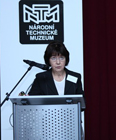 Lecture by professor Halina Lichocka, Polish Academy of Sciences, about the participation of Czech scientists in the activities of the Academy of Sciences in Krakow, presented on 28 May 2015 at the National Technical Museum in Prague.
Lecture by professor Halina Lichocka, Polish Academy of Sciences, about the participation of Czech scientists in the activities of the Academy of Sciences in Krakow, presented on 28 May 2015 at the National Technical Museum in Prague.
A hand-written rescript of His Imperial and Royal Apostolic Majesty Franz Joseph I sparked off the preparatory works aimed at establishing an Academy of Sciences in Cracow. The rescript, written down in Vienna on May 2, 1871, was addressed to the Minister of Education Josef Jireček. The Emperor`s letter read as follows: « …My wish is to establish an Academy of Arts and Sciences in Cracow. I order you to be so kind as to start negotiations with the Cracow Scientific Society […], negotiations that will lead to the transformation of the Society into such an academy. I am awaiting respective motions to decide on them ».
The Association of Moravian institutes of the Czech Academy of Sciences that consists of the CAS institutes based in Brno and Ostrava and institutes that have detached units in Brno, Ostrava and the South Moravian Region, has prepared the well-arranged and detailed booklet with the information about the all CAS institutions in the Moravian region. You can download it here.
The Association of Moravian institutes of CAS was created by the Treaty of directors of institutions involved in the CAS on April 15, 2013. However, its roots are deeper, dating back to the Association of CAS Institutes founded on November 21, 2002. The aim of the association consists in particular in presentation, promotion and popularization of nonuniversity type of science and training in the basics of scientific work. It also seeks to coordinate interdisciplinary projects in CAS institutions in the Moravian region, it contributes to mutual awareness, cooperation and assistance to member institutes in organizational matters, consulting their common challenges and problems and presenting proposals and demands to the academy-level and other authorities. It also represents the member institutions with the municipal authorities of Brno and Ostrava, the South Moravian and Silesian Region, universities and media in the region.
Infections following joint-replacement surgeries: Europe’s orthopaedic experts consult on how to optimize prevention and therapy strategies
For all the advances being made in this discipline, postoperative infections remain a great challenge for orthopaedists and trauma surgeons. More than 7,000 experts from around the globe are gathering in Prague for the 16th EFORT Congress to consult on ways to optimise prevention and therapy for these dreaded complications. More information https://www.efort.org/prague2015/.
Scientific progress the past 150 years is highlighted in a new permanent exhibition at the Mendelianum Visitor Centre in Brno. Its focus is the publication in 1865 of Experiments in Plant Hybridization by Johann Gregor Mendel, the “Father of Genetics” and a world class scientist. The Mendelianum Centre is located on the premises where Mendel’s scientific society held its meetings. Visitors are given an insight into the world of genetics and molecular biology. The Mendelianium is a well-equipped laboratory that enables visitors to engage in numerous methods and laboratory techniques from the pollination of pea flowers to gene expression. This project aims to strengthen public interest in research in genetics and molecular biology and reveals the practical and social impact of discoveries in these two major areas.
more 12 Mar 2015 The Next Horizon of Technology AssessmentThe PACITA network, a network of TA institutions from across Europe, held its second European TA conference under the motto "The Next Horizon of Technology Assessment", aiming at taking stock of and supporting exchange on TA capacities available in Europe. The conference brought together for three days in Berlin a broad and diverse range of TA experts and others interested in critically reflecting the role of technology in society. They shared knowledge and experiences with various practices of technology assessment such as cross-disciplinary expert studies, stakeholder involvement, citizen consultation and parliamentary discourse, stimulating mutual learning of TA practitioners and researchers. The conference was organized by Karlsruhe Institute of Technology (ITAS/KIT) and the Technology Centre of the Academy of Sciences of the Czech Republic. More about project – http://berlinconference.pacitaproject.eu/
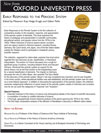 Oxford University Press recently published the work of Soňa Štrbáňová from the Institute for Contemporary History of the Academy of Sciences of the Czech Republic in the monograph Early Responses to the Periodic System. It is a comprehensive and timely reference. Oxford has generously arranged to make Early Responses to the Periodic System available to “friends and family” of the work at a special price for a limited time. You will receive 30% off the list price of $35.00! For more information or to take advantage of this exclusive discount, please visit https://global.oup.com/academic/help/ordering/?cc=cz&lang=en& and type promotion code: ASPROMP8 at check out.
Oxford University Press recently published the work of Soňa Štrbáňová from the Institute for Contemporary History of the Academy of Sciences of the Czech Republic in the monograph Early Responses to the Periodic System. It is a comprehensive and timely reference. Oxford has generously arranged to make Early Responses to the Periodic System available to “friends and family” of the work at a special price for a limited time. You will receive 30% off the list price of $35.00! For more information or to take advantage of this exclusive discount, please visit https://global.oup.com/academic/help/ordering/?cc=cz&lang=en& and type promotion code: ASPROMP8 at check out.

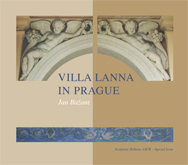
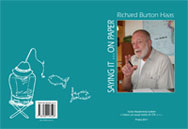


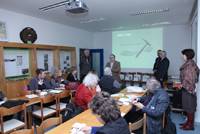










 Česky
Česky
